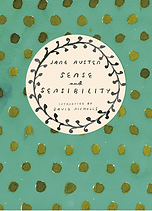Jane Austen lived a long time ago. 1775 - 1817 to be exact. She was the daughter of a reverend and one of seven children. Jane began her career by writing plays for performance within her own family, but none of these plays were ever published.
Jane was brilliant. Jane was revolutionary, and Jane was a woman. In the 18th century, women were not respected as writers, so her work, though considered fashionable, was mostly regarded as a passing fad. Little did the world know, Jane was inventing the genre of Romance as we know it today.
The woman who invented romance led a life mostly void of romance. Jane admitted to falling in love with a Tom Lefroy, but because it was not a financially beneficial match the couple was split up and she never saw him again. Years later Jane received a single marriage proposal that she accepted and revoked the next day. She never married.
The women in Jane's novels seem to hold Jane's values. All the main female characters marry for love rather than for wealth or position. Many of her characters turn down marriage proposals because they were not in love, much like her own marriage proposal.
What connections can you find between Jane and her characters?
Jane: the woman who invented romance

What makes her books so good
In the years since Jane's death her books have been both celebrated and criticized, but never ignored. Many scholars study Jane Austen as they study Shakespeare, bookending their classical literary education with the work of these two masters.
Jane Austen's novels have been translated into 40 languages. Pride and Prejudice has sold 20 million copies to date. In 2007 it passed the Bible on book sale charts. There is even a cult known as the Janeites who don period clothing and host regency parties in Jane's honor. So, what is it about Jane's books that make them so timeless?
Many scholars, critics, and fans claim it is the incredibly complex characters she creates. You cannot find a character in a Jane Austen novel who is lacking in development or personality. For actors performing in any of the many adaptations of her novels, you should find no shortage of character development tools in the novel itself.






